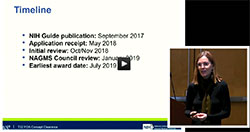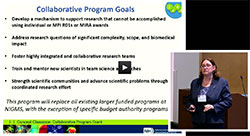For some time now, NIH has offered the Multiple Program Director/Principal Investigator (PD/PI) Award, also known as the MPI award, as an option for investigators seeking support for research projects. At NIGMS, we’ve been thinking about collaborative research, and we want to share some of our observations so you can choose the grant mechanism that best fits your research goals.
An MPI application is a commitment by two or more investigators. Both/all have the authority to direct the research project, should agree on how they are going to accomplish this, and will describe their project leadership plan in the grant application. If awarded, both/all have the shared responsibility to direct the research and ensure that it remains on track both intellectually and logistically. Some examples of these shared tasks include experimental design, resource allocation, supervision of staff, financial management, data sharing, and submission of publications. The responsibilities can be rotated over time. If both/all investigators are not full and equal partners in the award, it isn’t really an MPI project.
The MPI award was developed to share credit among equals on research teams. In contrast, some applicants want to use MPI awards to accomplish unintended goals, for example, to elevate a junior scientist, to entice a luminary colleague who might not otherwise get involved, to add a new technical approach to the research, or to support a collaborator at another institution. However, there can be costs associated with such strategies:
- A young scientist PD/PI will lose her/his early stage investigator (ESI) status, which offers the advantage of having an application grouped with other ESIs at the initial review group meeting, a higher priority funding consideration, and sometimes a fifth year of an award.
- All PD/PIs will be considered under NIGMS’ policy for Support of Research in Well-Funded Laboratories, so that if any investigator has greater than $750,000 in direct costs awarded annually, then the entire application will receive extra scrutiny by our National Advisory Council.
- Furthermore, any PDs/PIs who fall under NIGMS’ policy for funding Investigators with Substantial, Unrestricted Research Support may hold no more than one NIGMS research grant.
Other types of awards, including a single PD/PI regular research grant (R01), may be better alternatives to an MPI award for supporting collaborative research. Here are a few points that investigators should consider:
- Collaborators often play an important role in a project and may commit specific effort and receive funds from an award. If at another institution, funds essential to accomplish the research can be delivered through a subcontract.
- Another viable way to enable an individual to participate in a research project is to name a consultant in the necessary area of expertise. Consultants can receive a fee for their work, if appropriate.
- Almost any relationship can be well-documented in a letter of support, so that the initial review group recognizes an established and committed scientific relationship.
The MPI award fills an important niche. But the mechanism can be misunderstood and may even be misused to the detriment of one or more of the PD/PIs. Always look carefully at the continuum of opportunities to support multidisciplinary research programs and collaborative research.
Starting this fall, NIGMS anticipates offering a new award called the Collaborative Program Grant for Multidisciplinary Teams (RM1), which is designed to support highly integrated teams of researchers working to achieve a shared objective. Watch the Feedback Loop posts and talk to your NIGMS program director to learn more.
![]() from the NIGMS RM1 Webinar have been posted.
from the NIGMS RM1 Webinar have been posted. 



